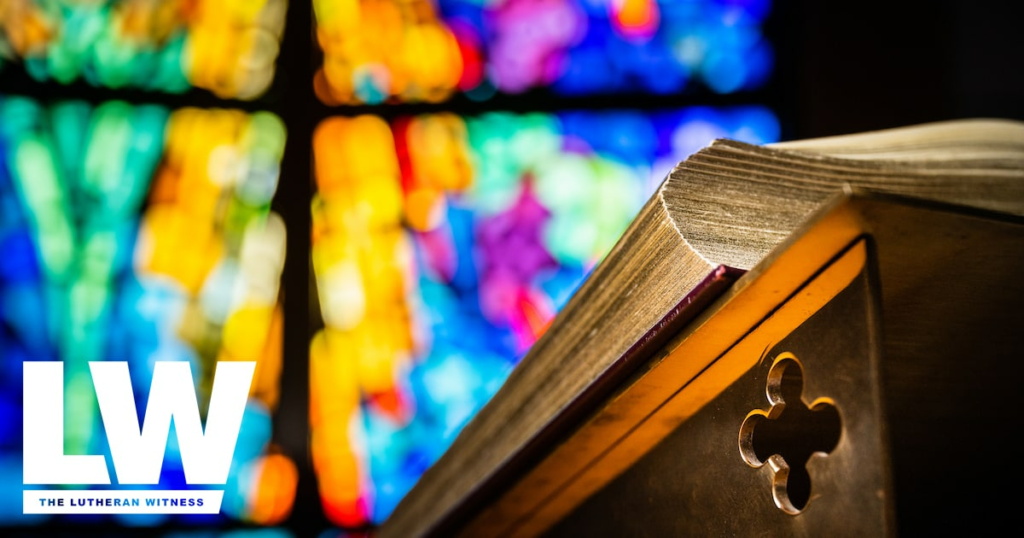Is there a difference between being spiritual and being religious?
by Rev. Travis J. Scholl
You know this one-liner by now, don’t you? You’re talking with somebody in the grocery store, and somehow your church comes up. Then you get the look: the tilt of the head, the naive smile, the dewy eyes, the feigned empathy, the suburban condescension. Then you get the line: “Well, you know, I’m spiritual but not religious.” Otherwise known as SBNR.
Pastors get it all the time. And all the time, we have to come up with an answer that simultaneously won’t offend and yet brings the point home that there really isn’t any difference between the two.
It wasn’t always this way. It used to be that spiritual and religious were synonymous. But since language is always and everywhere defined by its use, people have recently begun to understand spirituality as something other than religion. Spirituality is private, individual, touchy-feely. Religion is institutional, sectarian, rigid. Spirituality is how you get in touch with the divine. Religion is how you get brainwashed by humans.
Of course, I point to extremes, and in most cases, it’s a distinction without a difference. Sometimes I think people use the line simply because they’d rather stay in their pajamas and have a second pot of coffee on Sunday morning than get themselves up and out of the house. This is the line they use to keep their guilt at bay.
Moreover, even though the SBNR line of thinking is relatively new, it is all too American. Walt Whitman, 150 years ago, captured
it in two lines:
From this hour I ordain myself
loos’d of limits and imaginary lines,
Going where I list, my own
master total and absolute . . . .
Of course, the SBNR among us will take these two lines as a mantra without bothering to read the rest of the poem (“Song of the Open Road”). That’s part of the problem. And to understand the problem, we should take into account that SBNR thinking is the culmination of at least two of the strongest impulses in American society.
Individualism
Ever since the Declaration of Independence, America has been centered in the concept and consciousness of the individual and his or her life, liberty and pursuit of happiness. In some cases, it has served us well, especially in our radical aversion from any form of totalitarianism or tyranny. But in others, it has created a rugged individualism that shuns any kind of community or any sense of communal well-being, including any concern for our neighbor, especially when it is combined with a second impulse.
Consumerism
Perhaps free-market capitalism is one of America’s gifts to the rest of the world. But with it has come conspicuous consumption on a scale the world has never seen.
Its latest incarnation is in the ways marketing drives virtually everything we do. And virtually is the right word, because so much marketing now is driven by our Google searches and Facebook status updates.
When you combine these two–individualism and consumerism–within the religious marketplace, you get two things: entrepreneurship and cafeteria-style spirituality.
Historically, religious entrepreneurship has driven much of the vitality of American religion, including however many Great Awakenings we’ve had. But it also contributes to cafeteria-style spirituality, the sense that I can pick and choose what I like from however many different religions I find on Wikipedia. More often than not, such simplistic pieties undercut the cohesion and consistency that make meaningful religious identity and community possible.
Now, allow me a subtle distinction here. Cafeteria-style spirituality is not the same thing as the kind of engaged curiosity that is a healthy part of the Christian life. One produces an untethered balloon of saccharin platitudes and faux New-Age mysticism; the other is honestly curious about ideas, honors complexity, examines other expressions of religion with a deeper awareness of one’s own and stands on firm ground because it has engaged its own faith tradition with depth and an eagerness to learn. In fact, these two attitudes, which may on the surface look similar, are exact opposites.
Cafeteria-style spirituality isn’t really curious at all. Otherwise, it would realize that picking what you want out of a religion and leaving the rest doesn’t do justice to that religionor one’s own. It is just its own form of navel-gazing. God becomes whatever you see in the mirror.
Old-time religion calls that idolatry, which means it is no different from the First Commandment idolatries that plague all of us who have what Luther called incurvatus in se, the condition that we are all “curved in upon ourselves.”
In one way, I guess that means we have something in common with the SBNR crowd. It’s just that we have different idolatries to confront. And maybe that is our first point of contact with those who give us the “I’m spiritual but not religious” look.
Because, ultimately, in the long view, this is just one more fad in the marketplace of religion. And I venture a bet that in its place the pendulum will swing back again, and in its wake will be a return to more communal forms of religious experience. In our heart of hearts, we are relational beings. We are created to be in community.
The crux is whether we–pastors, congregations, and church-goers–will be ready to meet them where they are and to show them a different kind of community, one of authenticity and accountability, built on a foundation of grace and truth.
This assumes, of course, that that’s the kind of community that we–pastors, congregations, and church-goers–are already building. Perhaps we still have work to do.
—
> “5% of American adults say they do not believe in God . . . but only about a quarter (24%) of these nonbelievers actually call themselves atheists” (Pew Research Center).
About the Author: The Rev. Travis J. Scholl is managing editor of theological publications at Concordia Seminary, St. Louis.
June/July 2012





